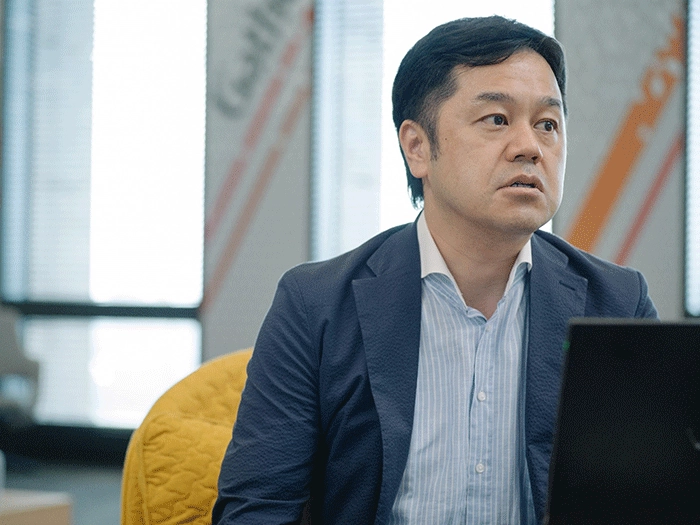SMBC Group Takes on the Challenge of NFTs, Collaborating with HashPort in Token Business

With the aim of building an ecosystem for the Web3(*1) era, Sumitomo Mitsui Financial Group (“SMFG”) and Sumitomo Mitsui Banking Corporation (“SMBC”) announced their entry into the token business in July 2022. The companies partnered with blockchain and token experts HashPort Group to establish Token Business Lab, which draws on the knowledge of both groups. The lab conducts research and pilot tests to drive the token business, and eventually plans to partner with more companies to spread the token business throughout Japan.
We talked with HashPort CEO Seihaku Yoshida and Hiromitsu Shimoirisa from SMBC’s Digital Strategy Department at the SMBC East Tower on the significance of a megabank entering the token business now and their next steps going forward.
*1.Web3 is the concept of a decentralized internet that makes use of blockchain technology instead of data being collected and managed by small number of specific companies. Individuals would hold and manage data and be able to freely exchange and trade it. It shows promise for solving the problems of data monopoly and fraud faced by the current iteration of the internet.
Finding new value in NFTs that are not speculative products
Tell us how the collaboration between your two companies came about.
SMBC had been involved in security tokens(*2) for a while, with a focus on digital security transactions. This token business targets individual customers, but customers’ interests in tokens has expanded beyond finance. Thinking that we could make use of tokens in business outside the field of finance, we held internal discussions on new business ideas.
An NFT(*3)-based business uses blockchains as a technical requirement, which meant we would need a partner. We approached some companies that operate NFT businesses and hit it off with HashPort Group as they were willing to consider new business ideas with us, so we started collaborating.

*2.Securities issued through digital means such as blockchain. STOs (Security Token Offerings) are a fundraising method that uses security tokens. They are expected to expand investment opportunities that meet the needs of a wide range of investors.
*3.Non-Fungible Token. Digital data that uses blockchain technology. An NFT is a symbol that provides a unique value to copyable digital contents, etc. Besides being unique, NFTs have the advantages of tradability, interoperability, and programmability.
My next question is for HashPort CEO Seihaku Yoshida. What was your first impression when you met with SMBC?
My first impression was that they had made concrete progress in their deliberations on an NFT-based business. NFT is a big keyword right now, so we have many customers who are considering it internally but don’t have a clear idea of what to do. But I was very impressed that SMBC had documents with concrete ideas ready at the first meeting. One of those ideas is something we are actually considering now, so I could tell they had a strong commitment and keen interest in innovation.
Tell us about that idea to the extent you can talk about it.
We imagined that our customers would be companies that already had IP (intellectual property). For example, if the customer was an auto manufacturer, we thought we could support publishing NFTs with the authority to vote on ideas for colors and forms when the manufacturer was developing a new car model, or maybe use NFTs as a special service for a fan community. It’s something different from the current business of converting digital contents to tokens and selling them.
As someone well versed in NFTs, what do you think of this idea?
It has two main features. The first is that SMBC’s main objective is not to sell NFTs, but to use NFTs to increase user engagement and evolve business. On that point they differ greatly from other companies. Rather saying we have an interesting IP so let’s make it into an NFT and try selling it, they are taking the next step and thinking about what changes the circulation of NFTs will bring. It is also revolutionary that a major company like SMBC is thinking about issuing NFTs.
Significance of a financial institution entering the token business
What do you think the significance of a financial institution entering the token business is?
There are many companies in Japan that have a variety of IPs, but in the current NFT market these IPs are treated as speculative products. Many companies are opposed to having their important IPs treated as financial tools, but little by little more companies are saying that they aren’t worried because financial institutions like SMBC entering the business will create a safer environment that supports issuing NFTs.
Currently, the trading of NFTs is generally done by crypto assets, but using crypto assets still presents a high hurdle for Japanese companies. However, if payments could be made by using something linked to legal tender, it would lower the hurdle for many customers. The reality now is that not only the price of NFTs fluctuates, the price of crypto assets also fluctuates. And it is difficult to handle crypto assets in terms of taxes, so in the current environment they are not easy for everyone to use. In that sense, I think it is significant that a financial institution is entering the token business.
I think that is particularly true in terms of enhancing credibility. A considerable number of our customers are interested in NFTs, but there are many cases where a front-line worker wants to do it, but it doesn’t get executive approval. For a customer that wants to incorporate NFTs into their business, partnering up with just a startup would seem dubious and unreliable. They could hire an attorney or consulting firm, but it would be difficult to develop it into an actual business. So, I think it is significant that customers can partner with a financial institution that is familiar, highly credible, and will give advice on a wide range of issues instead of partnering with a startup, consulting firm, or attorney.
Plus, with this project SMBC is taking on a challenge that involves NFTs, so the fact that they undergo transformation themselves and will share that expertise is also very persuasive to customers.
In addition to enhancing credibility, I think that the involvement of major financial institutions like SMBC will be able to turn the potential of the token business, which includes NFTs, into reality.
According to World Bank public data(*4) and research by Crypto.com(*5), the number of crypto asset users in 2022 was finally expected to catch up with the number of internet users in 1998. In other words, the current adoption rate of crypto assets is at the same level as the internet in 1998. The internet at the time was more like a toy for people with a little knowledge in computers, but as you know, now 20 years later it has been incorporated into almost every industry.
The same goes for blockchain technology. We are only seeing part of its potential and I am confident it will grow in the future. Tokens will be like apps in today’s smartphones and a wide range of tokens will emerge going forward.
In order to incorporate tokens into society, tokens will need to be connected deeply with and expanded into existing infrastructure, legislation, and other aspects of society. In the US, companies like Fidelity and JP Morgan are investing deeply in the field of blockchain. I’d like to expand this trend in Japan under the leadership of SMBC.
*5.Crypto.com research report (page 16)
Opening up new possibilities for the token business through various initiatives
What industries do you think are compatible with the token business?
I think theme is more important than industry. Now SMBC is focusing efforts on environmental initiatives, and I think tokens can be utilized for purposes such as proving the environmental value of not emitting CO2. They could be used as a tool to prove the source of renewable energy, and I think the fields of the environment and token business have potential.
Here is one example of an initiative we are implementing now. Hoops link tokyo, an SMBC Group open innovation center in Shibuya, issued four types of NFTs to mark its five-year anniversary. I wonder what value users will discover in the NFT badges issued when they visit hoops link. We will improve and expand our token business further based on the realizations we gain there.

What is the outlook of your companies’ collaboration going forward?
Right now we are discussing what our next steps will be with HashPort. We will conduct research and pilot tests to drive the token business at the newly established Token Business Lab. We are also considering issuing unique SMBC tokens, so stay tuned.
When proposing to more companies to enter the token business going forward, we will demonstrate the effectiveness of tokens through proof of concepts. Collaborations will result in great potential for the token business, so it is important to collaborate with as many companies as possible. We will start by explaining the basics of NFTs, so if there are any companies that are interested, please contact us. Through more opportunities like this, I hope to find better approaches.
Conclusion
SMBC Group and HashPort entered into a basic agreement(*6) on starting concrete deliberations to launch a new joint venture focused on achieving practical application for Soulbound Tokens(*7) (SBT) on December 8, 2022.
*6.“Consideration of a Business Partnership with HashPort Group in the Soulbound Token Domain” press release on December 8, 2022.
*7.SBT is a non-transferable NFT. They are issued as tokens that show the work history and behavior history of individuals with an SBT wallet by leveraging that feature. The wallet that stores various SBTs is called a “Soul” because they represent the identity of the wallet’s owner.
On December 23 that same year, the companies will hold a joint online event called “Non-transferable NFT (SBT) Will Bring Innovation to Web3! SMBC and HashPort Will Pave the Future.”(*8) The event features special guests who will discuss themes such as “What are Soulbound Tokens (SBT), a keyword for Web3?” and “How will Web3 be used in developing new businesses going forward?” In this way SMBC Group and HashPort Group will continue to deliberate on developing a safe Web3 economic sphere.
DX-link plans to feature more articles on the partnership with HashPort, including on SBTs, in the future.
*8.“Non-transferable NFT (SBT) Will Bring Innovation to Web3! SMBC and HashPort Will Pave the Future”
-

HashPort CEO
Seihaku Yoshida
Seihaku Yoshida graduated from Keio University Faculty of Law in 2013. He joined BCG Digital Ventures, the digital business development unit of Boston Consulting Group, where he worked on projects in Japan and China as the youngest Venture Architect (handling investment and business development) at the Tokyo office. In 2018 he founded HashPort Inc., which provides consulting and systems to major crypto asset exchange service providers in Japan. In 2020 he established HashPalette, a subsidiary specializing in NFTs. The company successfully launched Japan’s first initial exchange offering (IEO), and operates one of Japan’s largest NFT ecosystems, which includes an NFT marketplace and NFT game studio. Yoshida serves as director of the Japan Cryptoasset Business Association, co-researcher at the University of Tokyo School of Engineering, and co-research member of the Cryptocurrency Research Project at the Keio University Global Research Institute.
-

Senior Vice President, Digital Strategy Department, SMBC
Hiromitsu Shimoirisa
Hiromitsu Shimoirisa joined the Sakura Bank (currently SMBC) in 1998. After assigned to the Financial Market Department, Shimoirisa worked for 18 years in sales and development of derivatives and trust products. In 2013 he developed corporate investment products that utilize hedge products and trusts as head of the Product Development Group. In 2016 he developed investment products for institutional investors as Senior Vice President of the Distribution Department, which was established to drive the company’s O&D (origination and distribution) business. Shimoirisa has worked in the Digital Strategy Department since 2021, where he promotes open innovation at hoops link tokyo and researches and studies cutting-edge technologies such as digital currency, security tokens, NFT, and the metaverse.
